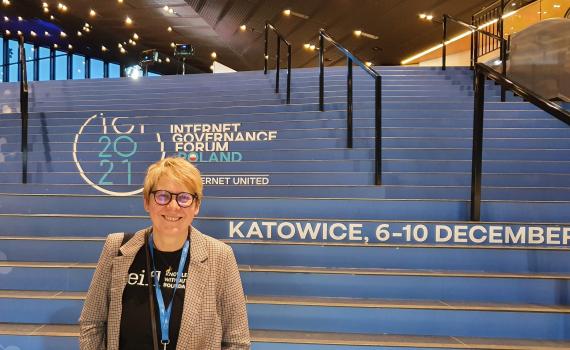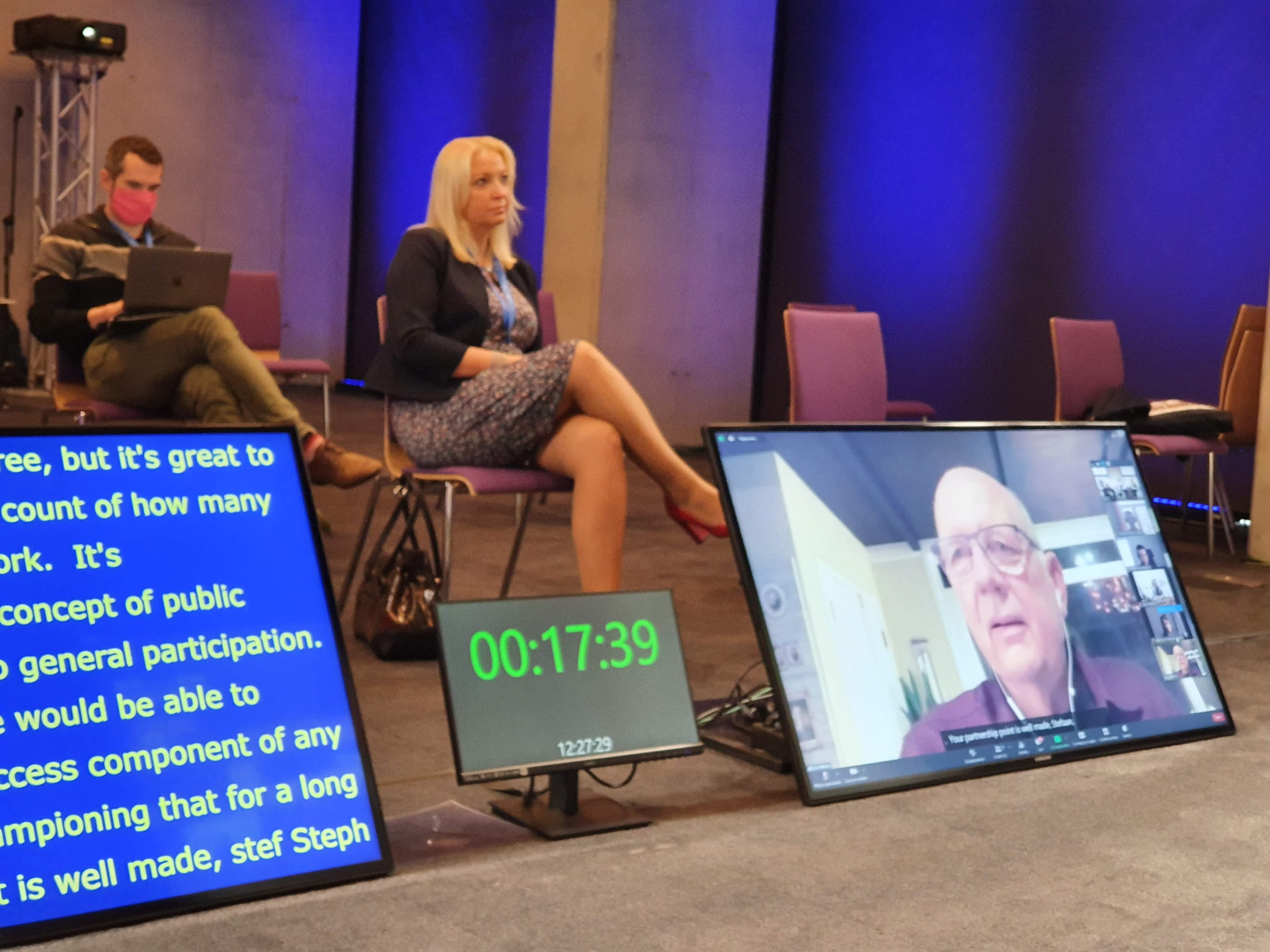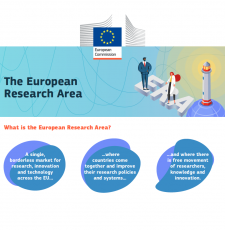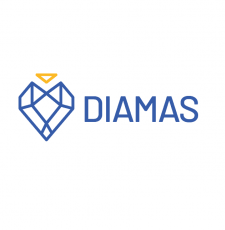
Ramune Petuchovaite, EIFL Public Library Innovation Programme (EIFL-PLIP) Manager, shares her insights from the Internet Governance Forum (IGF) 2021, which took place in Katowice, Poland, and online, from 6 - 10 December. The theme of the 16th annual IGF was ‘Internet United’.
IGF 2021 attracted a record 10,371 registrations from 175 countries. Most people participated online, and I was happy to join around 3,000 delegates representing governments, the technology sector and civil society who attended in-person sessions in the award-winning Katowice Congress Centre in Poland.
Under the overarching theme ‘Internet United’, online and onsite participants shared new ideas, and discussed challenges and deepening social and economic inequalities resulting from the COVID-19 pandemic, especially in the least developed countries. The main topics were new trends in digital technology and good practices in deployment and use of ICT that have the potential to shape the internet and improve people’s lives in a post-pandemic world.
In her opening address, Doreen Bogdan-Martin, Director of the Telecommunication Development Bureau of the International Telecommunication Union (ITU), noted the growth in the number of of internet users: “We had what we call a COVID boost with almost 800 million users coming online since 2019. That is encouraging news, but it is still very far from good enough because 2.9 billion people or 37% of the world's population remain totally shut out of the online world. ‘Internet United’ is much more than just a theme. It's an urgent call to action to bring meaningful connectivity to all.”
Throughout the forum, I got the impression that discussions around the need to build digital capacity had increased - no doubt spurred by the huge increase of newcomers to the digital world and the need for global strategies to recover from the disruptive impact of COVID-19 on jobs, health and education systems. “As COVID‑19 changes and challenges the world, the importance of building capacity for digital transformation has become ever more urgent. Throughout the pandemic, we witnessed how global inequalities can be exacerbated by the digital divide, which is not only due to lack of digital connectivity, but also gaps in building digital capacity,” said Maria Francesca Spatolisano of the Department of Economic and Social Affairs at the UN.
Digital competences discussed during Forum sessions included technology skills to help people get online, and critical thinking and media information literacy to help new internet users to make sense of the online world, recognize misinformation and hate speech, and to be alert to threats to their privacy. Cybersecurity skills and software, coding and other technical training to boost numbers of ICT professionals for all areas of the economy were also highlighted.
The ITU and the UNDP (United Nations Development Programme) used the opportunity of the IGF to announce the launch of a multi-stakeholder network (MSN) for capacity building – an outcome of the UN Secretary General's roadmap for digital cooperation. The network operates an online database, currently featuring over 100 digital capacity development providers and resources (among them EIFL webinars). For libraries that are already providing, or are planning to provide, ICT and information training in their communities, the MSN database is a useful resource.
Libraries narrowing the digital divide
 In 2011, EIFL and IFLA co-created a Dynamic Coalition within the IGF focused on internet access in public libraries: the Dynamic Coalition on Public Access in Libraries (DC-PAL). Since then, the DC-PAL has organized a session during the annual IGFs to bring public libraries into IGF discussions.
In 2011, EIFL and IFLA co-created a Dynamic Coalition within the IGF focused on internet access in public libraries: the Dynamic Coalition on Public Access in Libraries (DC-PAL). Since then, the DC-PAL has organized a session during the annual IGFs to bring public libraries into IGF discussions.
In 2021, in the main session, ‘Digital cooperation in practice: IGF Dynamic Coalitions’, Valensiya Dresvyannikova of IFLA drew attention to two papers jointly developed by EIFL and IFLA within the DC-PAL that demonstrate the contribution and expertise of libraries in the IGF’s key issue area ‘Universal Access and Meaningful Connectivity’:
- ‘The Role of Libraries in National Broadband Plans and Policies', research examining the roles of libraries in 32 national broadband plans and policies and providing case studies of public library ICT services in five countries.
- ‘Impacts of Public Access to Computers and the Internet in Libraries’, a working paper summarizing evidence of the impact and benefits of public access in libraries in different countries and regions, and of the research methodologies that have been used to assess and measure impact and benefits. [Readers are invited to give feedback on the paper - email valensiya.dresvyannikova [@] ifla.org before 15 February 2022].
Championing of public access in libraries by EIFL and IFLA was fruitful. The Katowice IGF Messages, a compilation of takeaways from IGF2021 to provide decision-makers with an overview of approaches to some of the most pressing internet and digital policy issues, notes the potential of public access through libraries:
“Public access through institutions such as libraries can help deliver on all of the components of access that help drive development – equitable and inclusive connectivity, content and competences. The COVID-19 pandemic has demonstrated that countries had to prioritize the massive development of connectivity infrastructure to connect the unconnected to an increasingly digital world.” - Katowice IGF Messages, Theme 4, ‘Universal Access and Meaningful Connectivity’.
Examples of meaningful connectivity through public libraries
During this year’s DC-PAL session, EIFL and IFLA led a round-table discussion on universal access to the internet and meaningful connectivity. Invited speakers from different countries presented examples of how libraries are making a difference in their communities.
Yuan Oktafian of the Indonesian IGF spoke about the library connectivity programme PerpuSeru, which used ICT to create community learning centres in almost 800 public libraries in villages. The libraries are now offering digital literacy training, craft learning and other courses.
Magdalena Gomułka, Senior Librarian, Silesian Library in Katowice Poland, and Agnieszka Koszowska of Information Society Development Foundation in Poland, provided examples of public library programmes that are helping seniors to become confident users of mobile devices, tablets and computers. They also emphasized the power of libraries as a network to broaden the impact of the internet through national and regional initiatives, for example, in 2021 libraries contributed to the Safer Internet Day carrying out 3,971 events across Poland, and also joined the ‘Hour of Code’ campaign with 367 events to engage people in fun coding exercises.
Alice Kibombo, Wikipedian in Residence at AFLIA (the African Library and Information Associations and Institutions), spoke about a project in which 150 librarians learnt about use, editing and teaching Wikipedia in libraries. As a result, librarians engaged 469 people from 34 countries in Africa and Asia, to create and upload local content - 843 articles, 2,560 photos, and 617,000 references in less than one year.
Ezio Neyra Magagna, former director of National Library of Peru, spoke about two successful initiatives that helped Peruvians to ease isolation during COVID-19 lockdowns: Biblioteca Pública Digital to provide remote access to contemporary books; and Memoria Perú that digitized and promoted learning and reuse of a national heritage collection consisting of thousands of historic images, newspapers, scores and films.
During the second part of the DC-PAL session, two speakers addressed the issue of meaningful connectivity in hard to reach urban and rural communities. Débora Prado of APC showcased examples of community-owned internet networks in Congo, South Africa and Brazil, and spoke about potential synergies between libraries and community connectivity centres. Don Means of Gigabit Libraries Network (USA) urged libraries to consider emerging providers of Low Earth Orbit Satellite Broadband, for example, Star Link, that promise to deliver high performance broadband at more affordable prices.
Watch the full DC-PAL session on the IGF YouTube channel.
Find out more and join preparations for IGF2022
- Planning has already started for the 17th annual meeting of the IGF, in 2022. Find out more about IGF2022 and join in the agenda-setting process by responding to the IGF2022 Call for Thematic Inputs (deadline, 14 February).
- Browse outputs, videos and transcripts of all IGF 2021 sessions.
SHARE / PRINT








